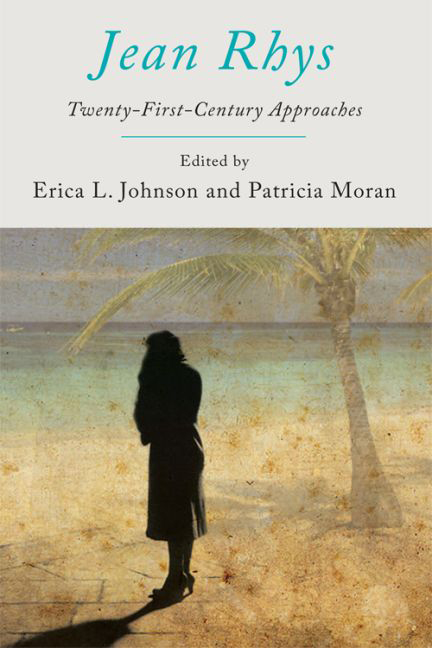Book contents
- Frontmatter
- Contents
- List of Figures
- Acknowledgements
- Notes on Contributors
- Introduction: The Haunting of Jean Rhys
- PART I Rhys and Modernist Aesthetics
- PART II Postcolonial Rhys
- 4 Jean Rhys's Environmental Language: Oppositions, Dialogues and Silences
- 5 Caribbean Formations in the Rhysian Corpus
- 6 ‘From Black to Red’: Jean Rhys's Use of Dress in Wide Sargasso Sea
- 7 The Discourses of Jean Rhys: Resistance, Ambivalence and Creole Indeterminacy
- PART III Affective Rhys
- Bibliography
- Index
5 - Caribbean Formations in the Rhysian Corpus
from PART II - Postcolonial Rhys
Published online by Cambridge University Press: 12 September 2017
- Frontmatter
- Contents
- List of Figures
- Acknowledgements
- Notes on Contributors
- Introduction: The Haunting of Jean Rhys
- PART I Rhys and Modernist Aesthetics
- PART II Postcolonial Rhys
- 4 Jean Rhys's Environmental Language: Oppositions, Dialogues and Silences
- 5 Caribbean Formations in the Rhysian Corpus
- 6 ‘From Black to Red’: Jean Rhys's Use of Dress in Wide Sargasso Sea
- 7 The Discourses of Jean Rhys: Resistance, Ambivalence and Creole Indeterminacy
- PART III Affective Rhys
- Bibliography
- Index
Summary
In ‘What is an Author?’ Michel Foucault highlights what he calls the ‘moment of individualisation’ through which the idea of the author came into being in the history of literature, philosophy and the sciences. Whereas most ‘commonsensical’ understandings of the term today conceive of the author as pre-existing the text as its source, Foucault reframes the author as an ‘author-function’ that has historically been produced through its interaction with both the text and its audience. For instance, he points out that before the seventeenth or eighteenth century, works like tragedies or comedies were evaluated for their content and didn't ‘need’ an author as a guarantee of quality. By contrast, works of geography and science were only deemed accurate if attached to an author's name. This relationship between subject and author has since been reversed with scientific discourses being accepted for their own merits, while literary creations are now dependent on the author function. What is more, Foucault highlights how the ‘author function’ is also tied to the legal system. Indeed, the latter needs authors insofar as it needs individuals that can be held accountable for potentially transgressive communications. Sometimes, the concept even transcends the person it is meant to refer to, since, as with Freud or Marx, we may have authors who are ‘not just the authors of their own works. They have produced something else: the possibilities and the rules for the formation of other texts’ as ‘founders of discursivity’, that is as founders of entire discourses such as psychoanalysis and Marxism. ‘Author’ in this reframed understanding therefore involves a plethora of endless meanings rather than a description of a self-determining and originating source. Therefore, as Foucault points out, it is an unnatural, historical phenomenon, a function of discourse, not because there is no actual, historical person behind the writing (there is), but because the meanings attached to the act of writing and its author are diverse and contextual.
I argue that what a Foucaultian reading of Jean Rhys's work reveals is the extent to which non-human landscapes in literature similarly harbour a multiplicity of meanings. These meanings work in tandem with other sites of difference like gender, race and class to produce the category ‘human’ in a way that has gone unaddressed in the current ecocritical consensus surrounding the untenability of the human/nonhuman dyad.
- Type
- Chapter
- Information
- Jean RhysTwenty-First-Century Approaches, pp. 107 - 122Publisher: Edinburgh University PressPrint publication year: 2015



